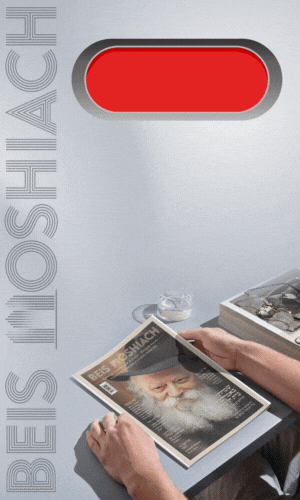Rabbi Eliyahu Bisk, OBM
We are deeply saddened to report on the passing of Rabbi Eliyahu Bisk, OBM, who was Moser nefesh in the former USSR and a longtime resident of Nachlas Har Chabad and more recently Toronto passed away Monday, 20 Adar • Full Story
We are deeply saddened to report on the passing of Rabbi Eliyahu Bisk, OBM, a longtime resident of Nachlas Har Chabad and more recently Toronto passed away Monday, 20 Adar.
In 5761, he related to Beis Moshiach about life in the USSR and how he left, and visiting the Rebbe:
“I was born in 5688 (1928) in Yanov, in the Venezia area of the Ukraine. Until the age of five I knew no language other than Yiddish. My father was a talmid chacham. For over ten years he studied in the famous yeshiva in Kishinev until he was drafted into the Czar’s army. He was given ordination for rabbanus by the roshei yeshiva and was considered the rav of our community.
“When I was a little boy, my parents moved to the suburbs of Moscow due to the great hunger prevailing in the Ukraine of the ‘30’s. It was a neighborhood of shacks on the edge of the city, which had previously been inhabited by gypsies and now was populated by Jews. The Communist education planted such a strong hatred for religion in everyone’s heart that even our Jewish neighbors conspired against us. They called me and my brother names and referred to us as “rabbanim’lech,” but we remained silent in the face of this anti-Semitism that came from our fellow Jews.
On Shabbos, my brother and I accompanied our father on a two-hour walk to shul. We left at six in the morning and arrived at shul only after eight o’clock. At a later point, my father rented an apartment near where we lived and we had a small minyan there, composed mainly of elderly Jews.
“Unfortunately I had to attend the government school, but I tried not to go on Shabbos. Each week I dreamed up another excuse to explain my absence. When I was little I would say that I had been sick. When I grew a bit older, I explained that my mother was sick and needed my help. Every such excuse needed a proper doctor’s note, which we got from a Jewish woman doctor, a real angel.
“When the government began insisting that students attend school, and was especially determined that the Jewish students attend on Shabbos, I walked, of course, and offered various excuses why I couldn’t write.
“At home, I studied Chumash and Mishnayos with my father every day. People generally did not keep these s’farim at home. But my father, who did not hide the fact that he was observant, was not afraid to have these s’farim.
“In the summer of 5701 (1941), World War II reached us. When the German army advanced in the direction of Moscow, we had a difficult decision to make. My parents were worried about us, but the obstacle to fleeing was that my father worked in the civil defense of Moscow and could not leave the city. After much deliberation, my parents decided that my brother and I would go along with my mother to Tashkent in Uzbekistan. This city served as a haven for refugees fleeing the scene of battle. The decision for my father to remain alone in a dangerous area was difficult, but we had no other choice.
“We found Jewish families who helped us tremendously. I’d like to mention the family of R’ Mordechai Sirota, a’h, R’ Nachum Labkovsky, a’h, and others, who made sure we didn’t starve to death at a time when many people did just that.
We lived in Tashkent for two years. My mother dealt in various necessary haberdashery items that were hard to obtain, such as needles and thread, material, etc. She bought from one place and sold to another. Every so often we received letters from my father, and sometimes money, which helped prevent us from starving. Even when there was money, it was necessary to expend great effort to obtain bread, as the lines in front of the stores that sold bread were very, very long.
“Upon graduating school, I debated over whether to enlist or continue my studies. Both choices had their challenges. In the army it was difficult to keep kosher and keep Shabbos, as opposed to the university, where that was easy to do. On the other hand, the atmosphere at the university could lead me astray.
“I thought about this for days until I decided to stay at the university. I kept quiet in class and did not stand out as a Jew so they wouldn’t pay attention to me. Naturally I did my best not to show up on Shabbos, or at least not to write on Shabbos, but unfortunately I wasn’t always successful.
“Upon graduating university, I got a job in a firm that manufactured electrical transformers, in the main laboratory doing experimental research in electronics. I was appointed manager over a group of workers who did research, which included three engineers, four technicians and two workers.
“During the week, I tried to work overtime, even nights, in order not to have to work on Shabbos. I always said I wanted two days off – Saturday and Sunday (Sunday is a day off anyway).
“Once in a long while I had to show up for work on Shabbos, but then too, I tried not to desecrate the Shabbos, although this was exceedingly difficult. I would sit in the office and the engineers and members of the group would bring me the results of the research they had finished so that I could approve the work. I pushed it all off and did nothing on Shabbos.
“We always had the feeling that even though the KGB did not interrogate us, they knew everything about us. For this reason we hid activities we did not want them to know about. We finally discovered, by Divine providence, that the KGB was definitely watching us.
“…It turned out that the minyan, which was comprised of seniors, did not interest the secret police. They wanted to know who organized the minyan. My father, who organized the minyan, was not afraid; he did not hide the fact that he was religious.
“My father-in-law was the Chassid R’ Yisroel Konson, a’h, from Moscow. Since he was a former prisoner, he was forbidden to live in Moscow, but he continued living there under his wife’s name, Labkovsky, while officially he had moved to live in Riga, Latvia…
“In 5725 (1965), my parents left for Eretz Yisroel and settled in Kfar Chabad. In order to emigrate you needed an official invitation from friends or relatives there, and by 5726 I was able to present a request to emigrate to Eretz Yisroel. We had to go through hell to get permission to leave. We had to get a number of permits, among them one that said we had no debts, and another one that was a character reference from our place of employment.
“…I told him I was firmly resolved to leave the Soviet Union for Israel with my family. “All I need from you is the character reference,” I concluded.
“The foreman was afraid to give me the document on his own, so he sent me to the manager of the firm. After struggling hard to convince him, I got the paper I needed. I took all the paperwork and dragged myself over to the OVIR office. To my great sorrow, a month later I received a rejection of my request without any reason given.
“Three years passed before I decided the time had come to present my request to emigrate once again. The difficulty was that after the Six-Day War, diplomatic ties between the Soviet Union and Israel had been broken.
“After consulting with friends, I asked my mother-in-law’s brother, Nachum Labkovsky, who lived in France, for an invitation to unite our families. Again I approached my foreman in order to obtain a character reference. When I told him I was going to France, he laughed for a long time. I finally got the paper with no further problems, but once again my request was rejected by OVIR…”
Visiting the Rebbe
“At the beginning of 5732, I went to the Rebbe MH”M for the first time. My yechidus lasted a quarter of an hour. I had the yechidus with my wife, and I asked the Rebbe for a bracha for the chinuch of my children, that they go in the path of Chassidus. The Rebbe replied, “Mentchen vellen zich vinchen hoben a zelecha kinder vi ba aich” (People will wish to have children like yours).
“After a few years in which it was hard to find work, I was taken on as an electrical engineer at the Tel Nof Air force Base, despite my age (43), because they needed employees in this field. I worked there for 22 years until I retired. After I left, I threw myself into work with the Russians who have been coming in recent years, to teach them about Judaism and Chassidus. In my free time I compose and write songs in Russian and Hebrew. The longing for Moshiach’s coming is a common theme.
“I give classes to new immigrants every morning, primarily to those from the Bukharan community, under the auspices of CHAMA, which is run by Rabbi Moshe Nisselevitz and Rabbi Sholom Dov Ber Gorelick. I also give classes to immigrants in Yishuv Bnei-Ayash, in Ashkelon, and Be’er Sheva.
“It’s hard to put into words my feelings as I learn with these precious Jews. I am thrilled that despite everything, am Yisroel chai! Seventy and eighty-year-old Jews, who were utterly cut off from Yiddishkeit for so long, are slowly returning to their roots…
“At our first yechidus in 5732, an amazing thing happened that I would like to tell you about. After speaking about our children, I presented the Rebbe with a letter from the SHAMIR organization. Betzalel Schiff and Professor Branover gave it to me to give to the Rebbe, and waited for me to convey the Rebbe’s response to them.
“The Rebbe began reading the letter and suddenly, without our saying a word, he looked up, looked at my wife, and said, “Whoever needs to arrive, will arrive.” That was all. The Rebbe continued giving me answers about the letter without referring to the peculiar statement he had made.
“I left the yechidus in a tumult. I had no idea what the Rebbe was referring to. When I asked my wife whether she understood, she thought for a few moments and then recalled that during the yechidus she had thought of asking the Rebbe for a bracha that her aunt and uncle and cousins still in Russia be allowed to leave.
“A few years later the aunt and uncle died and their daughter, with her children, emigrated to Eretz Yisroel. That’s when we understood what the Rebbe meant by, “Whoever needs to arrive, will arrive.”
***
In recent years, he moved to Toronto to be close to his children, and was a respected elderly chossid there.
He is survived by his children Rabbi Hirsch Rabiski, Rabbi Chayim Shlomo Bisk, and Rabbi Dovid Bisk.
Levaya was held today in Toronto.
Shiva visitation hours at 17 Shentone Rd:
7:30am -12:00pm
Shachris minyanim 7:30am, 8:30am, and 9:30am
6:00pm – 9:00pm
Mincha 7pm
Maariv 7:50pm
Please respect the family’s privacy for such situation and come only at the proscribed times.
Baruch Dayan Ha’emes.
328
Join ChabadInfo's News Roundup and alerts for the HOTTEST Chabad news and updates!










































